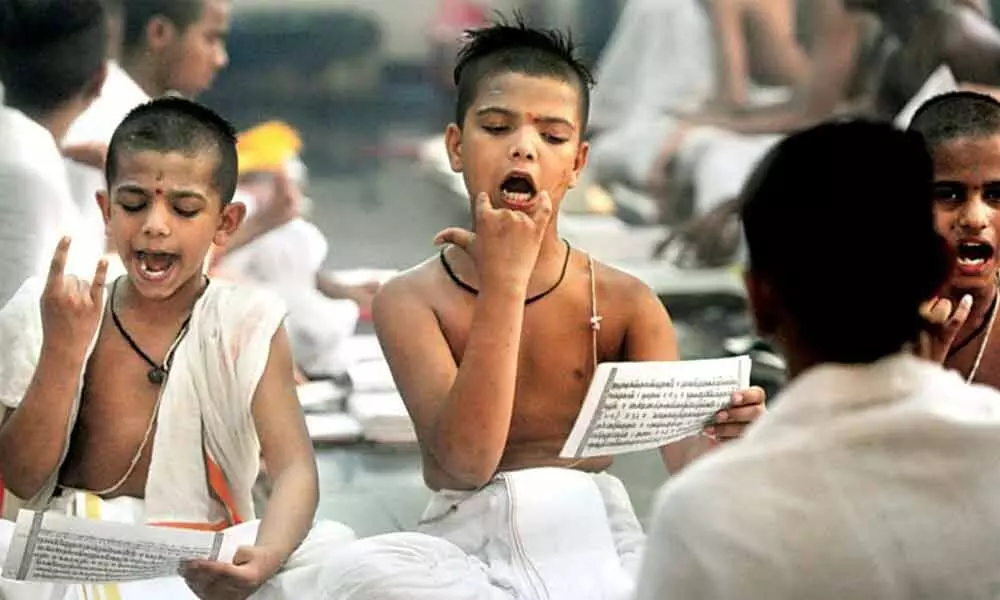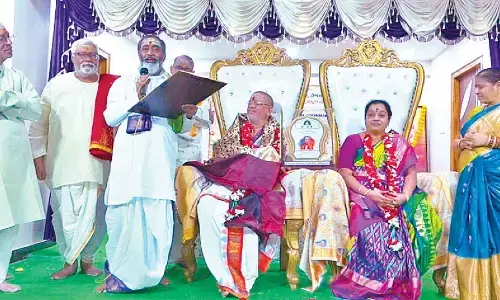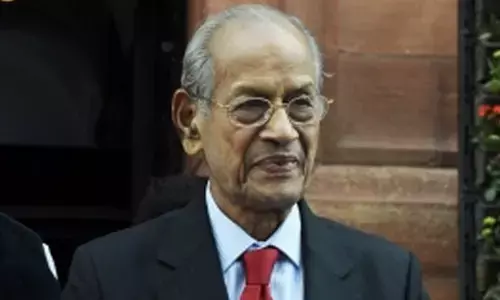Essence of Vedas and Upanishads

Essence of Vedas and Upanishads
The Upanishads reflect the last composed layer of texts in the Vedas. In an alternate classification, the early part of Vedas is called Samhitas and the commentary are called the Brahmanas which together are identified as the ceremonial karma-kanda, while Aranyakas and Upanishads are referred to as the jnana-kanda.
Sayana was a Sanskrit-language writer and commentator. His major work is his Vedartha Prakasha (literally, "the meaning of the Vedas made manifest"), or commentary on the Vedas. His commentary on the Rigveda was translated from Sanskrit to English by Max Müller.
Rig Veda is the oldest of the four Vedas, containing 1028 hymns and 10,600 verses divided into 10 mandalas (books). These hymns are dedicated to Rigvedic deities, and discuss cosmology too.
The verses in it, are recited to date in certain ceremonies like weddings and religious prayers. The Vedas are a collection of hymns and other ancient religious texts written in India between about 1500 and 1000 BCE.
It includes elements such as liturgical material as well as mythological accounts, poems, prayers, and formulas considered to be sacred by the Vedic religion.
Upanishads and Vedas are two terms that are often confused as one and the same thing. Actually, they are two different subjects for that matter. In fact, Upanishads are parts of Vedas.
Rig, Yajur, Sama and Atharva are the four Vedas. A Veda is divided into four parts, namely, Samhita, Brahmana, Aranyaka and Upanishad.
It is actually unbelievable, that any texts have survived from the ancient world at all.
The earliest known surviving copies of any of the Vedas are copies of the Rig Veda and Atharva Veda that are currently held in the Bhandarkar Oriental Institute in Pune, Maharashtra, India.
But one can learn the purpose of the Vedas by reading from the Puranas like Srimad Bhagavatam, and of course, the Gitopanishad or Bhagavad Gita, which is the essence of all Vedic literature.
By reading Bhagavad Gita one will be able to understand the Vedas.
The Vedas reject the multiplicity of Gods in the clearest possible terms and speak about One God, who is Omnipresent, Omnipotent and Omniscient and absolutely and absolutely formless, who is ever unmanifest and who never assumes human forms or never descends on earth in any form- human or otherwise.
In that sense, the Vedas are eternal. The Veda is divided into four great books: the Rig-Veda, the Yajur-Veda, the Sama-Veda and the Atharva-Veda. The Yajur-Veda is again divided into two parts, the Shukla and the Krishna.
The division of the Vedas into four parts done by saint Ved Vyas is to suit the four stages in a man's life.
The Atharva Veda is the "knowledge storehouse of atharvāṇas, the procedures for everyday life". The text is the fourth Veda, but has been a late addition to the Vedic scriptures of Hinduism according to some.
A legend has it that during the creation, the demons Madhu-Kaitabha stole the Vedas from Brahma, and Vishnu then took the Hayagriva form to recover them.
The two bodies of Madhu and Kaitabha disintegrated into twelve pieces (two heads, two four arms and four legs).
The earliest list of the Seven Rishis is given by Jaiminiya Brahmana: Agastya, Atri, Bhardwaj, Gautam, Jamadagni, Vasishta and Vishvamitra followed by Brihadaranyaka Upanishad with a slightly different list: Gautama and Bharadwaj, Shandilya and Jamadagni, Vasishta and Kashyap and Atri, Bhrugu. The word Brahmin translates to 'Supreme Self' or the first of the gods. Brahmin is the highest Varna in Vedic Hinduism.
Some say, Vedas came in 5000 BC and then Puranas came after that. According to modern research: Rigveda is the oldest of all Vedic scriptures.
According to Vedic scriptures itself, all the Vedic scriptures are eternal and appeared from Supreme person. Each Veda consists of four parts: The Mantra-Samhitas or hymns, the Brahmanas or explanations of Mantras or rituals, the Aranyakas, and the Upanishads.
Upanishads are last bit of Vedas. However typically by Veda people mean Veda Samhita - assuming that's the spirit of the question, Vedas came much before Upanishads.
For most authentic Vedas, one must rely only on person who is most learned scholar of Vedika Sanskrit, has devotion to Vedas, read it from a highly learned Sanskrit scholar, and devoted his whole life to Vedas learning and preaching.
Swami Dayananda Saraswati perhaps tops among such holy persons.
An analysis of the material in the Vedas reveals that, all the four Vedas replete the references regarding various aspects of medicine.
The Atharva Veda is deemed to be an encyclopaedia for medicine and Ayurveda (the science of life) is considered as Upa Veda (supplementary subject) of the Atharva Veda.
India is the only country that has a caste system. Brahminical canon says the fourfold varna system is as old as creation. The Rig Veda says that the gods created it by sacrificing the primal Purusha.
His mouth became the Brahmin, his arms, Kshatriyas, his thighs, Vaishyas, and his feet became Shudras.
Vyasa is a central and revered figure in most Hindu traditions.
He is also sometimes called Veda Vyas the one who divided the Vedas into four parts. Yoga is mentioned in the Rigveda, and also referred in the Upanishads.
For any time period, for any civilisation, it is essential that people in the society should possess absolute knowledge for a meaningful and purposeful existence.
No society, people or country can ever live without proper knowledge. The Vedas are a storehouse of knowledge from the God himself. They are the greatest body of knowledge ever known to mankind.
They are eternal and hence are always relevant to the world. The World may undergo changes as per the times, but the ultimate Truth will not change. It is all pervading, omnipresent and omnipotent like the idea of God himself!
Due to the peculiar historical past that India had, the relevance and teaching of the Vedas became almost extinct.
For centuries together, due to the rule of the invaders, we are fed with everything that is not ours. We were made to believe the trial-and-error method.
We were taught that the present western civilization is the epitome of all human learning, knowledge, progress and understanding.
We were made to study the Greeks, Romans, Egyptians, Mesopotamia but never about the Vedic culture, the most ancient, advanced, glorious and ever relevant culture that ever graced the planet.
We made to believe that science means modern science, history means the modern history; medicine means the modern medicine as they were evolved in the west. The emphasis till date is on the empirical data and knowledge but not the complete knowledge in its purest form.
The Vedas contain everything, spiritual, scientific and intellectual knowledge. From life and death to nature's secrets.
Reading the Vedas with an open mind and understanding gives one answers to questions that have no answers from the modern knowledge. Dharma, Artha, Kama and Moksha are the essence of Vedas.
Moksha is considered the highest goal of human life. Moksha is impossible without acquiring the knowledge of Absolute Reality. Vedas form the basis of our philosophical knowledge.

















